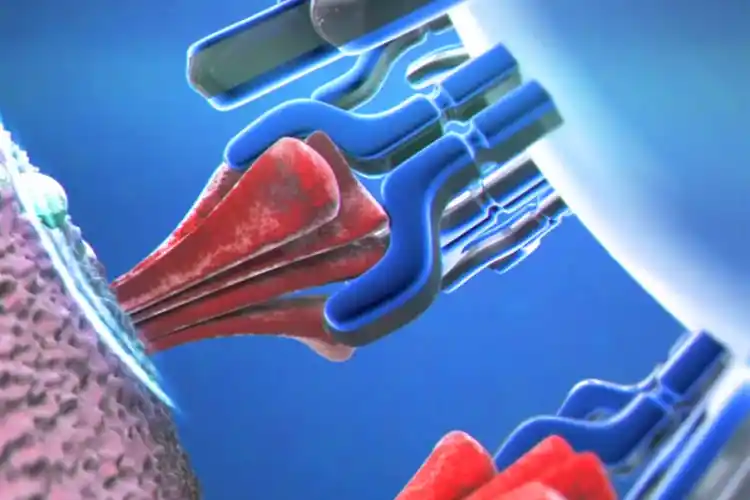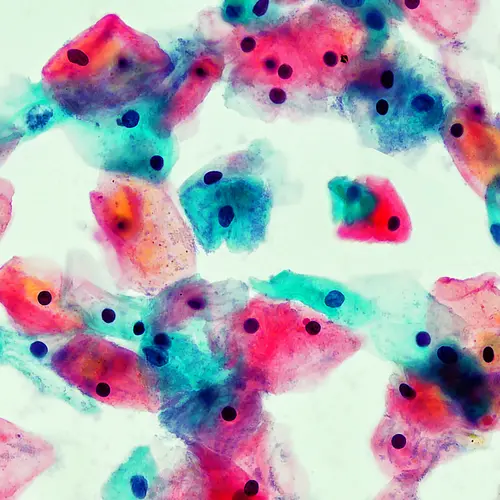How Immunotherapy Works

Hide Video Transcript
Video Transcript
NARRATOR
In the war against cancer, we're under siege. Luckily, reinforcements are on the horizon in the form of specialized treatments that use your own body to strike back-- cancer immunotherapy. ANDRES CHANG
Cancer is a process by which your body's own cells stop obeying the growth signals that your body puts out and start growing uncontrollably. NARRATOR
When your body's immune system detects something harmful, you create antibodies. ANDRES CHANG
Antibodies recognize those different parts of that particular virus or bacteria that we call antigens that are attacking our body. NARRATOR
If an antibody scans an antigen and determines it to be harmful, it activates an immune response. The alarm is raised, and the invader is attacked. Cancer will even cloak itself using substances that block our immune systems from properly identifying the intruder, leaving cancer free to infiltrate. Let's think of your body as a castle, a castle whose defenses have been overrun by cancer. Immunotherapy retrains and rearms your immune system to outwit cancer from within with a little help from outside your body. Immunotherapy works in two key ways. ANDRES CHANG
Through the use of antibodies and also through the use of immune cells that we modified in the laboratory to specifically recognize the cancer cells and kill it. NARRATOR
There are several types of immunotherapy, each with specific means and methods for combating cancer, the first and most common being monoclonal antibody treatment. Monoclonal Antibodies, or MABs, are man-made proteins designed to mimic human antibodies. Often referred to as targeted therapy, monoclonal antibody therapy trains your immune system to act like specialized archers that can target specific antigen signatures and strike. MABs with no drug or radioactive components are called naked MABs. These antibodies attach to antigens, hindering cell growth or acting as a signal marker for the immune system. MABs equipped with drugs or radioactive particles are called conjugated MABs. Lastly, bispecific MABs are composed of two kinds of MABs, meaning they can attach to two proteins at once, hitting cancer at two points for maximum effect. In your body's battle against cancer, intelligence is key. Enter the next type of immunotherapy-- CAR T-cell therapy.
ANDRES CHANG
T-cells are a type of immune cells that normally circulates around your body looking for signals that are present in cells that are infected with viruses or bacteria. NARRATOR
T-cells have their own way of attaching to foreign antigens called receptors. Antigens and immune receptors act like locks and keys where each antigen has a specific code that can be unlocked only by a corresponding receptor. T-cell receptors can be used to hack the coded antigen. To do this, T-cells are removed from a patient and sent to a lab. ANDRES CHANG
And they are genetically engineered so that the receptor against the cancer is now expressed in those T-cells. NARRATOR
They are genetically modified to add a specific Chimeric Antigen Receptor, or CAR. ANDRES CHANG
It now can recognize specific protein in the surface of a cancer cell. NARRATOR
CAR T-cells are reintroduced, now equipped with the deciphered antigen code to begin the precise work of finding and destroying cancer cells. A healthy immune system can tell normal cells from unhealthy or foreign ones. One way it does this is through the use of checkpoints. Immune cells are held back until a foreign cell passes through a checkpoint, triggering an immune response.
ANDRES CHANG
Cancer takes advantage of that system by expressing those checkpoints, as well. And they express it oftentimes at a higher level, so that allows the cancer cells to hide from the immune system. NARRATOR
Immune checkpoint inhibitors break the bond that cancer cells have with immune cell receptors, unmasking them as intruders and removing the checkpoints, keeping your immune system at bay. Immune checkpoint inhibitors don't directly attack cancer but rather remove the barriers that are keeping your body from working at full force. In addition to MABs, CAR T-cells, and immune checkpoint inhibitors, cancer immunotherapy also includes specialized vaccines. ANDRES CHANG
I think the future for cancer research and treatment is very bright. We have seen tremendous advances and improvements over the last few years driven by our better understanding of the immune system and how to use cancer immunotherapy to attack cancer. NARRATOR
Immunotherapy offers hope in the ongoing war to eradicate cancer. 